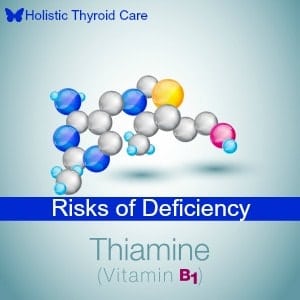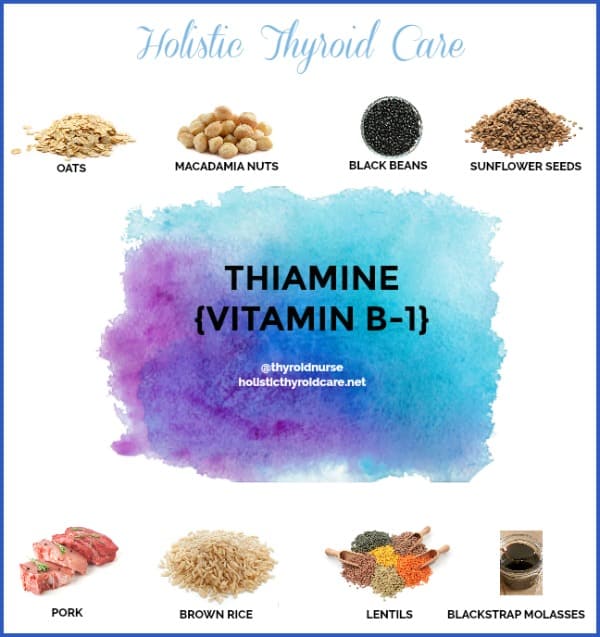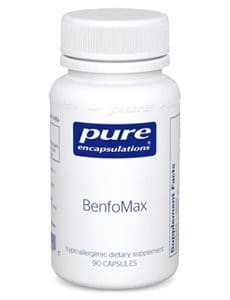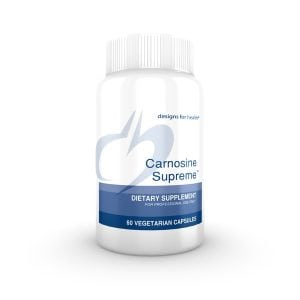Risks of Thiamine Deficiency
Thiamine, which is also referred to as Vitamin B1, is water-soluble and plays a role in the conversion of carbohydrates, the break down of fats and protein, digestion, nervous system, skin, hair, eyes, mouth, liver, and the health of the immune system. Thiamine also assists in blood formation and in the production of hydrochloric acid, which is important for proper digestion. In addition, brain function, normal appetite, growth, energy, learning capacity, muscle tone of the stomach, intestines, and heart all require healthy levels of thiamine. It’s no wonder why thiamine deficiency leads to severe and extreme problems and distressing symptoms.such as fatigue, heart issues, age-related cognitive decline, Alzheimer’s and more.
The role of thiamine as an antioxidant is beneficial for its anti-aging benefits because it converts carbohydrates (sugar) into energy, promotes growth, aids digestion, and is essential for nerve tissues, muscle fibers, and heart health. It also plays a vital role in the functioning of some key enzymes and is essential for the transmission of certain nerve signals between the brain and spinal cord. Vitamin B1 helps repel insects and mosquitoes and is used in the clinical setting for the treatment of alcohol and drug addiction.
Vitamin B1 cannot be made by the human body and is not stored in large quantities. It must be obtained through diet or supplementation.
Severe Types of Thiamine Deficiency
Beriberi – is an extremely serious and potentially life-threatening type of thiamine deficiency and is classified as dry, wet or infantile:
- Dry Beriberi affects the neurological system. Symptoms include nerve pain, muscle tenderness, and impaired nerve conduction throughout the body. Peripheral neuropathy is linked to both dry or wet beriberi and is usually felt as loss of sensation and pain in the feet and/or lower legs
- Wet Beriberi is associated with fluid overload in the tissues (edema), atrophy of muscles, congestive heart failure, enlarged heard, confusion, and enlarged heart
- Infantile Beriberi happens when an infant is fed a diet deficient in thiamine. If a mother is grossly deficient in thiamine, her baby can develop infantile beriberi which will cause a rapid heart rate (tachycardia) and may also cause convulsions
Congestive Heart Failure (CHF)
- Right-sided CHF happens when the right lower heart chamber (the ventricle) begins to have difficulty contracting to pump blood to the lungs. Symptoms include edema in the lower legs, abdomen, and organs as fluid backs up into the tissues. It is a serious although not as severe as left-sided heart failure and is somewhat manageable by controlling blood pressure, blood sugar balance and medications to improve overall function of the heart
- Left-sided CHF occurs when the left lower heart chamber (the ventricle) is no longer able to keep up the demands of pumping oxygenated blood to the body. The left ventricle is the “workhorse” of the heart and when it fails, fluid backs up into the lungs causing pulmonary edema. Symptoms include shortness of breath, respiratory distress while lying down, swelling of the legs, feet, and abdomen.
Why is Thiamine Deficiency a Concern for People with Hashimoto’s?
I recently did a comprehensive survey of my readers and found that fatigue/ lack of energy was reported as the primary concern for women with Hashimoto’s. Sometimes people will assume their fatigue and low energy is related to their thyroid dose. Although it definitely could be, more often than not fatigue is actually related to a nutrient deficiency, specifically thiamine. Carnitine, carnosine, and CoQ10 may also be contributing factors as well.
It’s no surprise that micronutrient deficiencies, in general, would be an issue for anyone with an autoimmune disease when you consider how autoimmunity presents obstacles for optimal digestion of food and absorption of nutrients.
Even though the most common contributing factor for thiamine deficiency is a high-carbohydrate diet, popular restrictive diets such as the autoimmune paleo diet (AIP) or paleo diet can lead to thiamine deficiency. As you will see from the list of foods below that contain thiamine, it’s no wonder vitamin B1 deficiency shows up on so many micronutrient test results for Hashimoto’s patients.
Please note that I am not advocating that you avoid these dietary plans – they can be excellent for eliminating symptoms, inflammation and help aid weight loss. What is important to note, however, is to be aware that these diets do pose potential challenges related to nutrient deficiencies which can lead to a new onset of risk factors and symptoms.
Energy production at the cellular level requires thiamine. Thiamine requirements are related to energy metabolism. For example, 0.33 mg of thiamine is [sic] required for every 4400 kJ of energy. For the average healthy adult, this equates to between 1.1 and 1.4 mg per day at a minimum.
Symptoms & Concerns Related to Thiamine Deficiency
- Lack of stamina
- Fatigue
- Feeling like you are “dragging” through the day, every day
- Never feel like you are awake – no matter how much sleep you get
- Exercise intolerance due to lack of strength
- Legs start to ache after a short walk
- Constipation
- Forgetfulness
- Enlarged liver
- Gastrointestinal disturbances
- Labored breathing
- Tingling in the feet
- Skin puffiness or tightness
- Water weight gain
- Foggy brain
- Stiffness
- Depression or low mood
- Irritability, anxiety
- Fibromyalgia
- Lower leg swelling
- Dry skin
- Rapid heart rate, +100 beats per minute (tachycardia)
- Established diagnosis of congestive heart failure (CHF)
Talk to your doctor to request testing to check your thiamine level and to discuss if thiamine injections or IV thiamine therapy to improve heart function are an option for you ?
How to Improve Your Thiamine Level
This is a list of foods which contain varying levels of thiamine – please note many of these are avoided on a regular basis by people with Hashimoto’s and for good reason. However, it also explains how and why a thiamine deficiency is likely to occur:
- Pork
- Salmon, wild-caught
- Organ meats, e.g. liver
- Whole grain & enriched cereals
- Brown rice
- Wheat germ
- Bran
- Brewer’s yeast
- Blackstrap molasses
- Egg yolks
- Fish
- Legumes, especially peanuts & peas
- Poultry
- Asparagus
- Broccoli
- Brussels sprouts
- Dulse & kelp
- Nuts
- Oatmeal
- Roasted, crushed garlic
- Onions, shallots, leeks
- Plums, dried prunes, raisins
- Watercress
- Chamomile, fennel seed, fenugreek, hops, nettle, parsley, peppermint, red leaf clover, sage, rose hips, yarrow, oat straw and yellow dock
- Catnip, cayenne, burdock root, eyebright, chickweed, alfalfa, and bladderwrack
Avoiding refined sugar and refined foods altogether is important. Consuming refined sugar on a regular basis can actually trigger thiamine deficiency. The richest sources of thiamine are found in yeast in many grains which explains why many people with Hashimoto’s would be deficient. We avoid those foods to help reduce inflammation in the body; however, keep in mind that thiamine needs are greater when the body’s metabolic requirements change, as in the case of hyperthyroidism, hypothyroidism, physical exercise, cancer, pregnancy & lactation, autoimmune disease, infections, and liver disease.
It’s also important to avoid excessive alcohol intake. Alcohol depletes thiamine quickly and if consumed on a regular basis long-term, it can lead to Wernicke-Korsakoff syndrome (confusion, double vision, disorientation, difficulty walking, and severe memory loss) inhibiting the GI tracts ability to absorb thiamine.
Thiamine deficiency is more common than people realize and it can lead to some serious problems.
Supplementation may be needed short-term or long-term. Consider your symptom burden and whether you are correcting a thiamine deficiency or preventing deficiency from happening in the first place.
For people with Hashimoto’s, I suggest preventing thiamine deficiency and maintaining optimal levels.
If you’re experiencing symptoms such as relentless fatigue/lack of energy and tiredness, edema, muscle atrophy, or any of the symptoms previously noted:
- Consider supplementation with BenfoMax (Benfotiamine, 200 mg) OR Carnosine Supreme (Benfotiamine 100 mg + Carnosine 450 mg)
Benfotiamine is a fat-soluble form of vitamin B1 and may be more effective than thiamine supplementation to optimize levels and reduce symptoms. Taking the capsules with a meal or snack that contains a small amount of fat to maximize absorption - After supplementing 4-6 weeks consider testing your levels with a Spectracell micronutrient test
Wishing you great health!
You May Also Enjoy: Coping with Stress
References
- Lonsdale, D. (2006). A Review of the Biochemistry, Metabolism and Clinical Benefits of Thiamin(e) and Its Derivatives. Evidence-Based Complementary and Alternative Medicine, 3(1), 49–59. http://doi.org/10.1093/ecam/nek009
- Shoeb, M., & Ramana, K. V. (2012). Anti-Inflammatory Effects of Benfotiamine are Mediated Through the Regulation of Arachidonic Acid Pathway in Macrophages. Free Radical Biology & Medicine, 52(1), 182–190. http://doi.org/10.1016/j.freeradbiomed.2011.10.444
- Smithline, H. A., Donnino, M., & Greenblatt, D. J. (2012). Pharmacokinetics of high-dose oral thiamine hydrochloride in healthy subjects. BMC Clinical Pharmacology, 12, 4. http://doi.org/10.1186/1472-6904-12-4
- Wohl, M. G., Brody, M., Shuman, C. R., Turner, R., & Brody, J. (1954). Thiamine and Cocarboxylase Concentration in Heart, Liver, and Kidney, of Patients with Heart Failure. Journal of Clinical Investigation, 33(11), 1580–1586.






Leave A Response